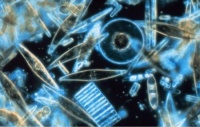Difference between revisions of "Category:Phytoplankton"
From REFORM wiki
| (8 intermediate revisions by the same user not shown) | |||
| Line 1: | Line 1: | ||
=BQE: Phytoplankton= | =BQE: Phytoplankton= | ||
| − | |||
| − | |||
| − | |||
<table width="100%"> | <table width="100%"> | ||
<tr> | <tr> | ||
<td> | <td> | ||
| − | [[Image:BQE_phytoplankton.jpg|200px]] <ref>[http://en.wikipedia.org/wiki/Phytoplankton Wikipedia. Phytoplankton]</ref> | + | [[Image:BQE_phytoplankton.jpg|200px]] |
| + | <ref>[http://en.wikipedia.org/wiki/Phytoplankton Wikipedia. Phytoplankton]</ref> | ||
</td> | </td> | ||
<td> | <td> | ||
| − | + | '''Phytoplankton''' refers to unicellular algae and cyanobacteria, both solitary and colonial, that live, at least for part of their lifecycle, in the water column of surface water bodies <ref> [http://www.wfduk.org/wfd_concepts/CIS_Glossary WFD-UKTAG,Terms and definitions under Water Framework Directive ]</ref>. Common parameters used for characterization are species composition and abundance, bloom characteristics, and biomass <ref> [http://www.wfduk.org/tag_guidance/Article_08/WP11k-guid WFD-UKTAG, Development of biological classification tools to support assessment and monitoring of ecological status under WFD]</ref>. | |
| − | + | <br> | |
| + | <br> | ||
| + | <p>The list of case studies where this BQE has been considered is presented at the bottom of the page under '''Pages in category "Phytoplankton"'''. Click on the name of the case study to see more information. </p> | ||
</td> | </td> | ||
</tr> | </tr> | ||
| Line 20: | Line 20: | ||
<references/> | <references/> | ||
| − | *[http://www.wiser.eu/background/ | + | See also: |
| − | + | *[http://www.wiser.eu/background/phytoplankton/ WISER Project EU. Phytoplankton] | |
| − | + | ||
Latest revision as of 09:50, 28 April 2010
BQE: Phytoplankton
|
Phytoplankton refers to unicellular algae and cyanobacteria, both solitary and colonial, that live, at least for part of their lifecycle, in the water column of surface water bodies [2]. Common parameters used for characterization are species composition and abundance, bloom characteristics, and biomass [3].
The list of case studies where this BQE has been considered is presented at the bottom of the page under Pages in category "Phytoplankton". Click on the name of the case study to see more information. |
References:
- ↑ Wikipedia. Phytoplankton
- ↑ WFD-UKTAG,Terms and definitions under Water Framework Directive
- ↑ WFD-UKTAG, Development of biological classification tools to support assessment and monitoring of ecological status under WFD
See also:
Pages in category "Phytoplankton"
The following 17 pages are in this category, out of 17 total.
BCFGHL |
PRS |
S cont.TV |
